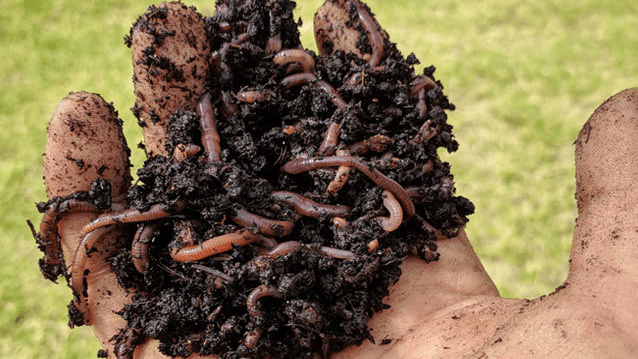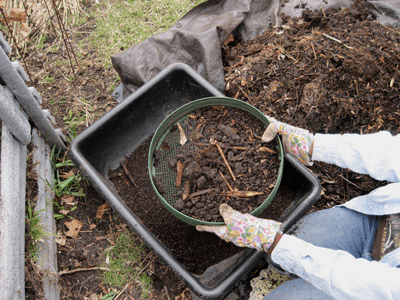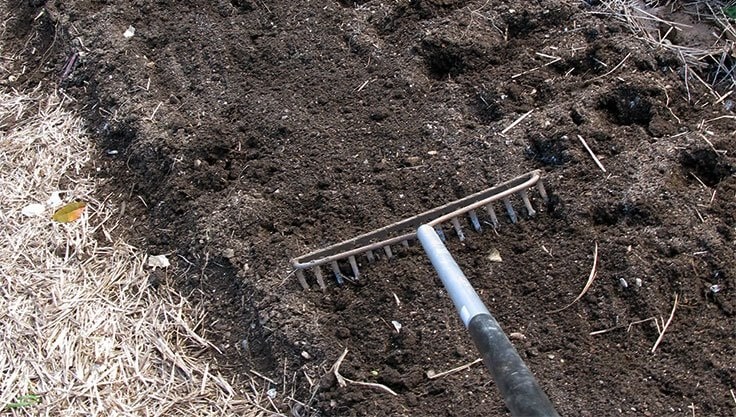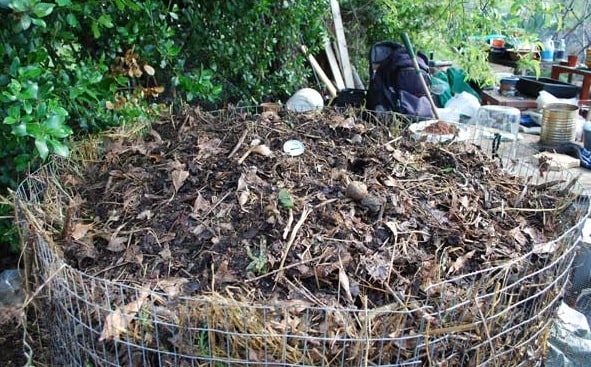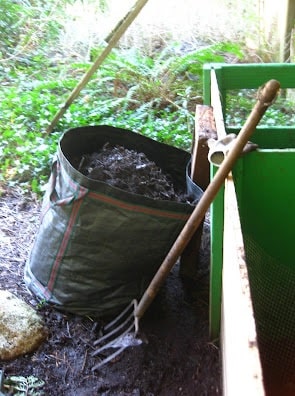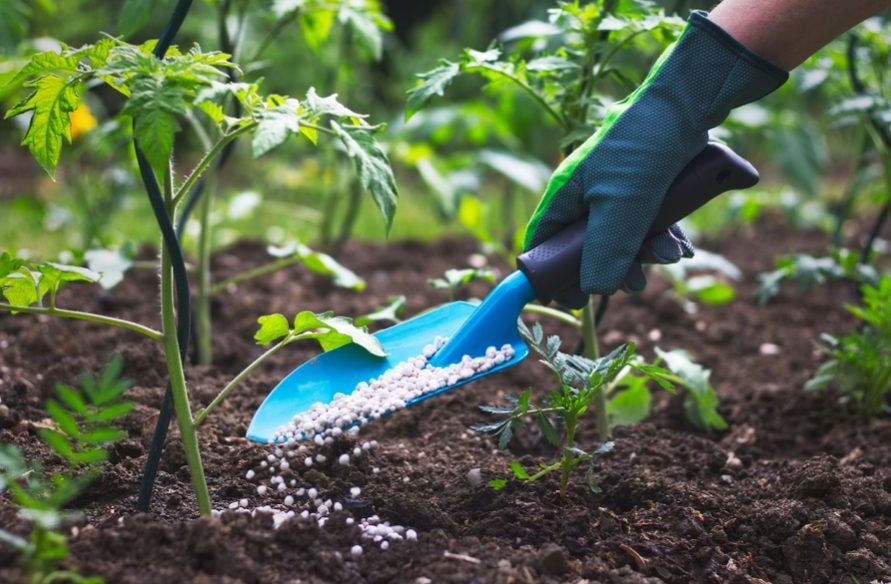Problem: Compost that is too dry can be a common issue, particularly in hot and arid climates or when using a lot of carbon-rich materials.
Solution: You can easily fix dry compost with these steps:
1. Add Water: The most straightforward solution is to add water to the dry compost. Start by sprinkling water evenly over the compost pile. Use a hose, watering can, or a bucket to do this. Be cautious not to overwater, as overly wet compost can lead to anaerobic conditions and foul odors. Aim for a moisture level similar to a wrung-out sponge.
2. Mix and Turn: After adding water, mix the compost thoroughly to distribute the moisture evenly. Turning the pile or bin aerates it and helps the moisture penetrate to the center. This will promote decomposition and create a more consistent environment for beneficial microorganisms.
3. Cover the Compost: Covering your compost pile with a lid, tarp, or even cardboard can help retain moisture and prevent further drying out. This is especially important in areas with intense sun and wind.
4. Adjust the Ingredients: If the compost remains too dry, evaluate the balance of green and brown materials. Add more green materials like kitchen scraps or fresh yard waste to increase moisture content. This will also help maintain a balanced carbon-to-nitrogen ratio.
5. Monitor and Maintain: Regularly check the moisture level of your compost and make adjustments as needed. Proper moisture is vital for a healthy composting process.
Contents
- 0.1 How to Rejuvenate Old Compost
- 0.2 Can You Add Water to Dry Compost?
- 0.3 Is Dried Out Compost Still Good?
- 0.4 What Happens If Finished Compost Dries Out?
- 0.5 How to Know If Compost Has Gone Bad
- 0.6 Why Does My Compost Look Dry?
- 0.7 Can I Put Baking Soda in Compost?
- 0.8 What Is a Good Compost Accelerator?
- 0.9 Why Is Urine Good for Compost?
- 0.10 What Is a Homemade Compost Activator/Accelerator?
- 0.11 What Is a Natural Compost Activator?
- 0.12 How to Jumpstart Compost
- 0.13 How to Make Your Compost More Active
- 0.14 Does Urine Speed Up Composting?
- 0.15 How Often Should I Pee in My Compost?
- 0.16 Is Female Urine Good for Compost?
- 0.17 Is It OK to Urinate in a Composting Toilet?
- 1 Author
How to Rejuvenate Old Compost
Problem: Old compost that has stopped decomposing or no longer resembles soil can benefit from rejuvenation.
Solution: Here’s how to rejuvenate old compost:
1. Turn the Pile: Start by turning the compost pile. This aerates the material and introduces oxygen, which is essential for decomposition. Mix the outer, less-decomposed materials with the center of the pile to even out the decomposition process.
2. Add Green Materials: If your compost lacks green materials, incorporate fresh kitchen scraps, grass clippings, or other nitrogen-rich materials. This provides the necessary nitrogen to kick-start decomposition.
3. Keep It Moist: Ensure that your compost has the right moisture content. Water it if it’s too dry or add dry, brown materials if it’s too wet. Proper moisture levels facilitate microbial activity and decomposition.
4. Shred or Break Down Large Items: If you have larger, undecomposed items in your old compost, consider breaking them down into smaller pieces or shredding them. This will speed up the decomposition process.
5. Cover and Wait: After making these improvements, cover the compost pile to retain moisture and heat. Allow time for the composting process to restart. Regularly turn and monitor the pile to ensure it remains on the right track.
6. Use a Compost Activator: If your compost needs a significant boost, consider using a compost activator. These are commercially available products that contain beneficial microorganisms to jumpstart decomposition.
Can You Add Water to Dry Compost?
Yes, you can add water to dry compost. Proper moisture is essential for the decomposition process in your compost pile. Compost should have a moisture level similar to that of a wrung-out sponge. To add water, evenly sprinkle it over the compost pile. Be careful not to overwater, as excessively wet compost can lead to anaerobic conditions and unpleasant odors. Regularly check the moisture level and adjust as needed to maintain the right balance.
Is Dried Out Compost Still Good?
Dried out compost can still be valuable as a soil conditioner. However, if compost is too dry, it may have slowed or halted the decomposition process. The microorganisms responsible for breaking down organic matter may become inactive in extremely dry conditions. To ensure efficient composting, it’s best to maintain the right moisture level in your compost pile. If your dried-out compost no longer resembles soil, you can rejuvenate it following the steps mentioned earlier.
What Happens If Finished Compost Dries Out?
If finished compost dries out after the composting process is complete, it will remain a valuable soil conditioner. The nutrient-rich material will still benefit your garden as long as it’s incorporated into the soil. However, to prevent the loss of valuable nutrients, store finished compost in a covered container or bin to protect it from further drying out or being leached by rain.
How to Know If Compost Has Gone Bad
Compost typically doesn’t go “bad” in the sense of becoming harmful. However, compost can go anaerobic, which means it’s not breaking down efficiently due to a lack of oxygen. Signs of anaerobic compost include foul odors, sliminess, and the presence of pests.
To avoid anaerobic compost, ensure proper aeration and moisture levels. If your compost exhibits these signs, it may need turning, and you should adjust the carbon-to-nitrogen ratio by adding more brown or green materials as necessary. If pests are a concern, avoid adding diseased or pest-infested plant material to your compost.
Why Does My Compost Look Dry?
Compost can appear dry for several reasons:
- Lack of Moisture: If you haven’t been regularly adding water or if your compost pile is exposed to drying winds and sunlight, it can dry out.
- Excessive Brown Materials: A high proportion of carbon-rich brown materials, like dried leaves or straw, can make the compost look dry. Balancing with nitrogen-rich green materials is crucial.
- Hot Weather: In hot weather, compost can lose moisture more rapidly. Consider covering your compost to retain moisture.
- Improper Aeration: If the compost is too compacted and lacks proper aeration, it can appear dry even if it contains some moisture.
Can I Put Baking Soda in Compost?
You can put baking soda in your compost, but it’s generally not recommended. Baking soda is an alkaline substance, and composting works best in a slightly acidic to neutral environment. Adding baking soda may disrupt the natural pH balance in your compost, potentially slowing down decomposition.
It’s generally better to focus on maintaining the right carbon-to-nitrogen ratio, moisture levels, and aeration in your compost to promote healthy decomposition. If you need to control odors in your compost, it’s more effective to manage the materials you add and maintain proper composting conditions.
What Is a Good Compost Accelerator?
A good compost accelerator, also known as a compost activator, contains beneficial microorganisms that can speed up the decomposition process. While there are commercially available compost activators, you can also make your own using materials like well-rotted compost, aged manure, or garden soil. These materials introduce a diverse population of microorganisms to your compost, helping break down organic matter more quickly.
Why Is Urine Good for Compost?
Urine is beneficial for compost because it’s a source of nitrogen, one of the key components required for successful decomposition. Human urine is generally sterile and rich in urea, which breaks down into ammonia, a potent source of nitrogen. When added in moderation, urine can act as an effective compost activator, providing the necessary nitrogen to balance the carbon-rich materials in your compost pile.
What Is a Homemade Compost Activator/Accelerator?
A homemade compost activator can be made by mixing nitrogen-rich materials into your compost pile to boost microbial activity. Effective homemade compost activators can include well-rotted manure, grass clippings, kitchen scraps, or fresh yard waste. These materials supply the necessary nitrogen to promote decomposition and can be mixed into your compost to jumpstart the process.
What Is a Natural Compost Activator?
A natural compost activator refers to any organic material that encourages microbial activity in your compost pile. Besides well-rotted manure, grass clippings, and kitchen scraps, other natural activators include alfalfa meal, blood meal, or even comfrey leaves. These materials provide the essential nitrogen and nutrients required for efficient decomposition.
How to Jumpstart Compost
To jumpstart your compost and accelerate the decomposition process:
- Add Green Materials: Introduce nitrogen-rich green materials like kitchen scraps, fresh yard waste, or fresh manure to provide a nitrogen boost to your compost pile.
- Maintain Moisture: Ensure your compost has the right moisture level, similar to a wrung-out sponge. Add water as needed, especially in dry conditions.
- Aerate and Turn: Regularly turn the compost pile to introduce oxygen, which promotes microbial activity. Mixing the materials helps evenly distribute moisture and air.
- Add a Compost Activator: Consider adding a compost activator or homemade activator like well-rotted compost, aged manure, or grass clippings to introduce beneficial microorganisms.
- Cover: Use a cover or lid to keep the compost pile warm and moist, further encouraging decomposition.
How to Make Your Compost More Active
To make your compost more active and efficient:
- Balance Green and Brown Materials: Ensure a proper balance of green (nitrogen-rich) and brown (carbon-rich) materials in your compost pile. A balanced carbon-to-nitrogen ratio is crucial for decomposition.
- Maintain Moisture: Regularly monitor and adjust the moisture levels to keep the compost pile damp but not waterlogged.
- Aerate and Turn: Turn the compost pile regularly to provide oxygen for microorganisms and distribute moisture and heat evenly.
- Add Compost Activators: Incorporate compost activators like well-rotted compost, aged manure, or grass clippings to introduce a diverse microbial population.
- Shred Materials: Shredding or cutting larger materials into smaller pieces can speed up decomposition.
Does Urine Speed Up Composting?
Yes, urine can speed up composting when used in moderation. Urine is a source of nitrogen, which is essential for microbial activity and decomposition in a compost pile. It provides a readily available nitrogen source that accelerates the breakdown of carbon-rich materials. However, it’s important not to overdo it, as excessive urine can create imbalances and lead to an overly wet compost pile.
How Often Should I Pee in My Compost?
The frequency of adding urine to your compost depends on the size of your compost pile, the moisture level, and the amount of nitrogen already present. In general, adding urine once or twice a week is a reasonable guideline. However, observe your compost and adjust as needed to maintain the correct moisture and nitrogen balance.
Is Female Urine Good for Compost?
Female urine is just as suitable for compost as male urine. It contains nitrogen and urea, both of which are valuable sources of nitrogen for composting. The gender of the person contributing urine is not a significant factor in the composting process.
Is It OK to Urinate in a Composting Toilet?
Yes, urinating in a composting toilet is perfectly fine. In fact, many composting toilet systems are designed to handle both solid and liquid waste. Urine is a valuable addition to composting toilets as it provides nitrogen and moisture, essential for the decomposition of solid waste in the system. Just be sure to follow the instructions for your specific composting toilet model to maintain proper functioning.



